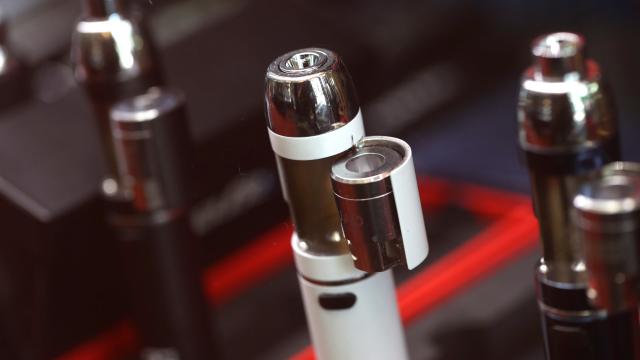Health officials in Wisconsin are looking into a scary-sounding cluster of cases that could be linked to vaping. Doctors in the state have reported eight cases of teenagers with similar lung damage and symptoms to the Wisconsin Department of Health Services (WisDHS) this month, the agency said in a health advisory released this week.
While the cause of these incidents isn’t confirmed, all of the teens had a recent history of e-cigarette use.
According to the WisDHS, the teenagers largely experienced symptoms such as coughing, shortness of breath and fatigue, while some also developed nausea, disordered eating symptoms and chest pain.
They had dealt with these symptoms for weeks or even months, but as they got progressively worse, they were eventually forced to seek hospital care. Medical imaging revealed the teens also had severe lung damage.
At this point, health officials have only ruled out the possibility of an infectious outbreak (one likely reason for that is that the patients don’t all live near each other). But though the cause is unclear, the only known link they seem to have so far is their e-cigarette habit.
There’s still the possibility that other things could be to blame, but the agency is warning doctors in the area to stay on the lookout for similar patients.
“All patients reported vaping in the weeks and months prior to hospital admission. The names and types of products used remain unknown, and patient interviews are ongoing,” the WisDHS said in the advisory released this week.
“Clinicians are encouraged to remain alert for potential cases among persons presenting with progressive respiratory symptoms who report a history of inhalation drug use, particularly vaping.”
[referenced url=”https://gizmodo.com.au/2019/07/juul-rep-visited-a-classroom-and-told-teens-vaping-is-totally-safe-for-some-reason/” thumb=”https://i.kinja-img.com/gawker-media/image/upload/t_ku-large/bv79wsxscweba1llwwrv.jpg” title=”Vaping Is ‘Totally Safe,’ Juul Rep Tells Classroom Of Teens” excerpt=”There’s a lot of debate about what belongs in the classroom, but it’s safe to say Juul doesn’t. However, two teens testified in US Congress on Thursday that a Juul representative had, in fact, visited their class in April 2018 as part of a health presentation and told them the company’s e-cigarettes were “totally safe”.”]
The latest news comes at the end of a bad week for the nascent industry, which has been roundly criticised by public health experts and the US Food and Drug Administration for discreetly advertising its products to underage customers.
Also this week, a Democratic-led congressional panel in the US heard testimony from two teens — Caleb Mintz and Phillip Fuhrman — about the alleged marketing practices of Juul Labs, whose e-cigarette products are the most popular in the country.
The two alleged that Juul orchestrated an educational program for their Year 9 class where a representative — after the teacher had left the classroom — repeatedly claimed that their products were “totally safe”.
Though the program, billed as a mental health and addiction seminar, was ostensibly meant to convince teenagers not to vape, Mintz also claimed the representative recommended that his friend struggling with nicotine addiction (Fuhrman) should look into vaping as an alternative to cigarette smoking. Unbeknownst to the representative, Fuhrman was already addicted to vaping, he testified.
Although there are plenty of experts who believe that e-cigarettes can play an important role in helping people quit cigarette smoking, others have argued that there’s still a lot about their potential health risks we’re in the dark about, especially when it comes to their use among teens.
“The popularity of vaping is obviously skyrocketing among our kids and its dangers are still relatively unknown. We don’t have a lot of information about the long-term effects or even the short-term effects,” said Michael Gutzeit, chief medical officer of Children’s Hospital of Wisconsin, which has treated all eight cases, in a release from the hospital.
“What we do know is vaping is dangerous. It’s especially dangerous in teenagers and young adults.”
The science is still settling on just how dangerous vaping truly is. Public health experts in the UK, for instance, have largely endorsed e-cigarettes as a crucial cessation aid, one that’s substantially less harmful than tobacco cigarettes.
Luckily, while some of the teen patients did need more extensive treatment, such as intubation to help them breathe, they seem to be on the mend now.
